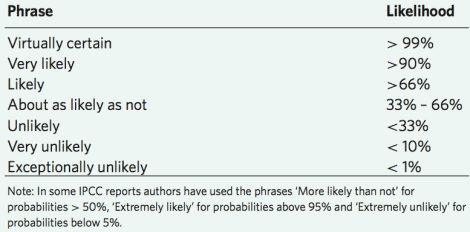It’s hard to understand what the U.N. Intergovernmental Panel on Climate Change is yammering on about.
The IPCC — which has released its latest climate assessment in three huge installments — uses confusing language to describe how certain it is about its findings. This could be misleading the public into thinking scientists are less certain than they really are about global warming, according to a new study.
Consider this statement from the first installment of the IPCC report, which came out in September: “It is very likely that the number of cold days and nights has decreased and the number of warm days and nights has increased on the global scale.”
By using the phrase “very likely,” the scientists mean that there’s a 90 to 99 percent likelihood that the statement is true. But when normal people read “very likely” in a statement like that, they think the IPCC’s scientists are just 55 to 90 percent confident in it, according to the new study, which was published in the journal Nature Climate Change.
Here are the seven main descriptors that IPCC report authors are told to use, and what percentage of certitude they’re meant to communicate:
The researchers behind the new study showed a series of IPCC statements containing these terms to 1,304 people from 25 different countries. The people were asked to judge the scientists’ confidence levels — and they got it very wrong.
“In all samples,” the researchers wrote, “people interpreted the probabilistic pronouncements of the IPCC regressively” — meaning they would underestimate high probabilities and overestimate low ones. The biggest misinterpretations came when the word “very” was used.
The researchers say people would better understand if the IPCC used numbers to express its confidence levels.
This isn’t the first time that the IPCC’s approach to communicating certainty has been found to be flawed. Similar findings were published in 2009 and in 2011. And an independent review of the IPCC pointed out this problem in 2010. But the IPCC persists in using this misleading gibberish. And if that weren’t bad enough, the panel still doesn’t understand how to effectively use the internet.





